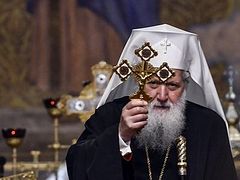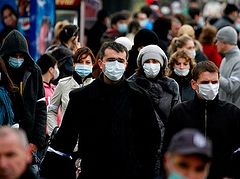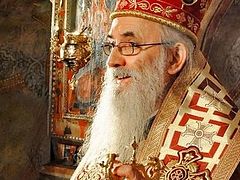Pskov, March 31, 2020
In his Sunday homily given at the Holy Trinity Cathedral in Pskov, His Eminence Metropolitan Tikhon (Shevkunov) of Pskov and Porkhov addressed the topic of the coronavirus pandemic.
While the churches in Russia remain open for the time being, Met. Tikhon called on the faithful to refrain from coming to Church services, but to pray at home, thus echoing the call of His Holiness Patriarch Kirill in his own homily on Sunday.
The coronavirus pandemic is the Third World War, in which we must fight with evil while observing preventative measures, said His Eminence Metropolitan Tikhon of Pskov and Porkhov during his Sunday homily at the Holy Trinity Cathedral in Pskov.
“75 years after the end of World War II, there’s a war again—a world war. I’m not exaggerating at all; I’m not putting any special anxiety or fear on you. That’s really how it is: a war between mankind and this evil that has come to us and against which we truly must fight. And some people—doctors, people who provide security, and maybe we, simple people—are just like our grandfathers and fathers during the war,” His Eminence said.
Part of that battle is to observe heightened sanitary measures, Met. Tikhon emphasized, including wiping down icons with disinfectants before and after venerating them (which applies to icons protected by glass).
He went on to cite the example of Italy, where more than 100,000 have been infected in just over a month.
“My friend, an Orthodox Christian living in a small city in northern Italy in the Brescia Region—it has 7,000 residents—called me recently and said: ‘We didn’t even think this could happen—the entire generation of those over 70 has died out!’” Met. Tikhon said.
Given that there have also been cases of coronavirus infection in the Pskov Province, His Eminence earlier called on pilgrims to refrain from visiting the famous Pskov Caves Monastery, where there are many elderly people.
“There was a wave of indignation: ‘Why? How? Is it possible to get infected in a monastery?’ Young people who are asymptomatic carriers of the virus come to our monastery from Moscow and St. Petersburg, stand next to old women, sneeze, cough, and simply breathe. And at close range, a person becomes infected. And what passes unnoticed and without a trace for a young person becomes not just a threat to their life, but a real trial—perhaps fatal,” the Metropolitan stressed.





